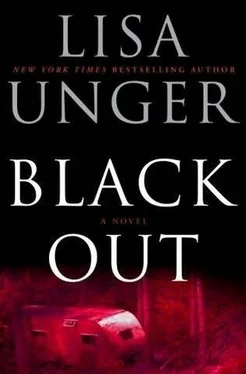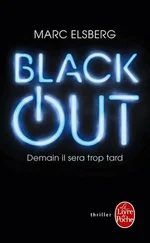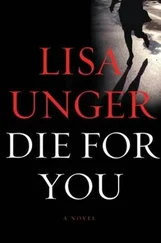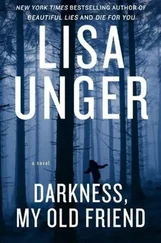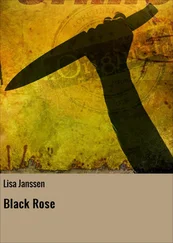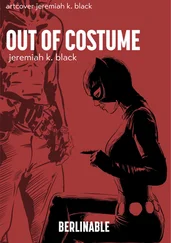My cell phone rings. It’s Detective Harrison again. This time I answer.
“What do you want, Detective? Is it money? Just tell me what you need to leave me alone and it’s yours.”
“Yesterday it was money. Today I’m not so sure.”
I’m driving too fast. I change lanes carelessly, and the Toyota behind me honks in protest. I lift a hand.
“Cell phones kill,” says the detective. “Did you know that you’re just as impaired driving while talking on one as you would be if you got behind the wheel drunk?”
I’ve given up talking. He’s one of those guys, the ones who won’t get to the point until they’re ready no matter what you say. He’s running an agenda; my presence in the conversation isn’t necessary.
“Let’s get together,” he says then.
“Really,” I say, angry now. “You know what? Fuck off, Detective.”
“No. You fuck off, Ophelia.” He leans on the name hard.
My stomach bottoms out. “Have you lost your mind?” I say. “Do you even know who you’re talking to? Or are you blackmailing so many people you’ve lost track?”
He doesn’t even play the game, just tells me where to meet him, a rest stop about twenty miles south of where I am. I have no intention of meeting him. I’d have to be insane to do that.
“I have to get home,” I tell him. “I’ll be missed. I have a family, Detective.”
He issues a nasty little laugh. “Let me tell you something: You don’t have anything unless I say you do.”
He ends the call. I hold the dead phone in my hand. Desperation and panic are eating an acid hole in my center. I try Gray on his cell phone and don’t get an answer. I hang up without leaving a message. After driving a few more miles, my mind racing through my various options, I exit the highway and make a turn, get back on, and head south. I’ll meet him, I tell myself. I’ll give him what he wants. Then he’ll go away. Just like Gray said. Why Gray didn’t go to see him, why he wound up killing Simon Briggs instead, I don’t know. There’s no time to think about it. I just need to finish this and get home.
As far as I know, my mother still lives on Frank Geary’s horse ranch in Central Florida. She believes I’m dead. I know from my father that she blames me for everything that happened to Frank, to her. She has turned the farm into a safe house for women in love with death-row inmates. She helps them lobby for new trials, conducts letter-writing campaigns for the examination of old evidence with new technology, comforts them when the worst happens. She even has a website, freetheinnocent.org.
A couple of years ago, I saw her on a talk show, defending herself against the families of murder victims. She looked old and worn, all her prettiness gone. I felt nothing when I saw her, except a slight nausea that she could have devoted so much time and feeling to this cause when she never showed a fraction of that love or concern for her own daughter. She wears a picture of Frank in a locket around her neck.
“He was an innocent man who died for crimes he didn’t commit,” she kept repeating. She made a weird rocking motion, seemed edgy and unstable. Even the other people on stage-a woman dating a death-row inmate, a death-row appeals lawyer, the wife of a man wrongly convicted and executed-stared at her, leaned their bodies away in an effort to distance themselves.
The show itself was sensational garbage, designed to create conflict among the participants. Families of victims were grouped on the other side of the stage-the mother of an abducted and murdered girl, the husband of a woman who was raped and murdered in their home, the sister of a young man who was the victim of a serial killer. Things started out well enough but naturally devolved into bitter tears and screaming matches. The audience jeered.
Eventually the questions turned to me and Marlowe. I watched with rapt attention, though I knew I shouldn’t. I just couldn’t turn it off.
“Do you think it’s something genetic or something learned?” the host asked my mother, a barely concealed look of disgust on his face. “How do you explain your daughter’s involvement with murderer Marlowe Geary?”
“I believe Marlowe Geary was innocent of the crimes he was accused of committing, just as his father was,” she said, jutting her chin out and blinking her eyes oddly. “He never had a trial. He was tried and convicted in the media.”
“The evidence is overwhelming,” said the host, a gray-haired man with a chiseled, heavily made-up face.
“Evidence lies,” she said, staring directly at the camera. “We all know that.”
About a year after Frank died, new DNA technology proved beyond a shadow of a doubt that he had killed at least two of the women he went to jail for initially-a local waitress named Lauren Miter and Sadie Atkins, a motel maid. Their families never stopped lobbying to prove Frank’s guilt and finally succeeded. I knew it must have been cold comfort, but maybe that’s better than nothing. I wondered about Janet Parker. She didn’t need technology to prove that Frank had killed her daughter. Her body knew, and the knowledge wasted her.
I have often wondered about the other women, a suspected thirteen in all. Women who went missing in a twenty-mile radius around the Geary home whose bodies were never found. What happened to them? Did they all die at the hands of Frank Geary?
“You didn’t answer my question,” the host said when the audience quieted down. “How do you explain your daughter’s involvement with Marlowe Geary?”
“I won’t speak ill of the dead. But my stepson was a good, good boy. I knew him to be gentle and kind. Ophelia was a very troubled young girl, headstrong and unhappy.”
“So what are you saying?” asked the host, incredulous.
“If he did anything wrong, she might have been the corrupting influence,” my mother said, widening her eyes and looking straight at the camera again.
I was stunned by the injustice of her words, the absolute delusional world she lived in. But still I couldn’t turn off the television. In the oddest way, it was good to see my mother, a comfort to hear her voice. We love our parents so much, even when we hate them, even when they abuse and betray us. We want so badly to be loved in return. If they only knew their power.
The show ended with a solitary man onstage, a representative from an organization dedicated to counseling the victims of violent crime and their families. He was a small, frail-looking man with a silky drift of strawberry-blond hair and sparkling green jewels for eyes. His voice wobbled slightly as he spoke in vagaries about how victims have to face down their fears rather than wallow in them. The techniques of his organization, he said, were “experimental and controversial but highly effective.”
“When we’re victimized or when we lose someone to violence, it changes the way we see the world. It opens a hole in the perception of our lives, and it seems like every bad thing, every monster, can enter through that opening. Facing the fear that’s left after you or someone you love has been victimized is the hardest thing you’ll do. But if you don’t do it, the fear will kill you slowly, like the most insidious cancer, cell by cell.”
He wouldn’t be specific about the organization’s techniques but offered a website: nomorefear.biz. I jotted it down, but when I visited it later, there was only an error page.
For three days following, my mother’s words ate a hole in my gut. I couldn’t eat or sleep, unable to rid myself of the sight of her, used up and unstable, blaming me for Marlowe’s crimes. I made a few more attempts to visit the website, but it was down every time.
For some reason I’m thinking about this as I pull off at the rest stop. The air is charged with bad possibilities as I drive down the access road and the highway disappears from my rearview mirror. I see Harrison’s SUV parked beyond the restrooms, in the farthest corner of the lot. I wonder if there’s anyplace more desolate and menacing than an empty rest stop in the middle of the night.
Читать дальше
